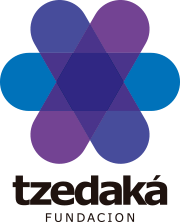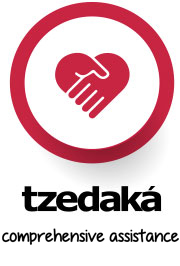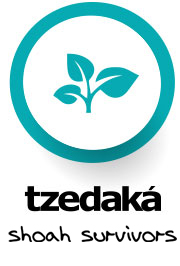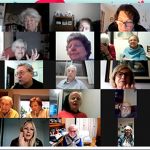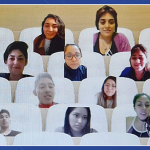On Wednesday, September 1st, the report entitled “The Argentine Jewish Community’s Response to the Pandemic—Support to Vulnerable Families and Impoverished Middle-Income Segments” was presented online.
Via Zoom, the findings of the quantitative and qualitative research study surveying the implementation and impact of the “New Demand” program were made public. This study was designed and carried out by the Argentine Jewish Community’s Social Protection Network, which includes the Asociación Mutual Israelita Argentina, (AMIA, Argentina’s Mutual Israeli Association), the American Jewish Joint Distribution Committee (the “Joint”), Fundación Tzedaká, and Fundación de Acción Social de Jabad (Jabad’s Social Action Foundation). The report was prepared jointly with the Argentine Catholic University’s Argentine Social Debt Observatory (ODSA-UCA, for its Spanish acronym).
“New Demand” is a temporary emergency social aid program for the Jewish community’s population that, as a result of the income loss caused by COVID-19 pandemic, has been plagued by financial distress. The aforementioned four organizations launched this program in May 2020 in Buenos Aires City’s Metropolitan Area, later adding other communities in other provinces to its scope.
“Ever since the pandemic started, community organizations have rolled out new overall social assistance programs, and we have strengthened the collaborative work we were carrying out before in order to provide more and better support to the people who have started to need urgent help as a result of sudden joblessness and income loss,” said the spokesperson for the Community Protection Social Network.
The report was presented by Agustín Salvia, head of the Argentine Catholic University’s Argentine Social Debt Observatory, and Alberto Minujín, head of the Equity for Childhood initiative, Joint advisor, and professor at The New School University.
Among other findings, the report noted that interviewees indicated that, as a result of the crisis caused by the COVID-19 pandemic, at least one member of their respective households suffered job-related issues. In turn, a few managed to continue their work from home, while others were forced to shut down their businesses or to stop working. In all cases, people’s overall income fell with the pandemic.
Faced with this challenging situation, some households sought to secure additional income via loans, especially from relatives, while a large share of the population interviewed reported cutting down their housing expenses or non-food spending—for clothing and recreation—to the extent, in some of cases, of discontinuing their medical insurance payments.
“We made a huge effort to reach out to this population, as most of these families had never joined a social assistance program before. ‘New Demand’ strove to serve these people who were socially vulnerable, on the edge of poverty, and who were severely hit by the pandemic,” said Alberto Minujín.
“Starting in May 2020, 815 households were admitted into the program, for a total of 2,208 people. Thus far, 25% of these families have left the program, which is a positive indicator, as it shows that one out of every four people has managed to recover her ability to secure an income,” he added.
“At households with individuals holding informal or unstable jobs, the help provided by the program proves instrumental to ensuring a minimal livelihood, while, at households where the impact of the pandemic meant a temporary loss of income, the assistance brought by ‘New Demand’ tends to be viewed as ‘additional support’—a ‘relief’ that adds to other available resources,” Agustín Salvia remarked.
“Against this backdrop and apart from the financial assistance, most interviewees underscored their involvement in ‘New Demand’ as well as the social and emotional support they received from these organizations,” he noted.
To conclude, the heads of the social programs deployed by the institutions that participate in this Network expressed their gratitude for the philanthropic contributions that made this program possible, highlighting their organizations’ “commitment to continue focusing on finding collective solutions for the people who were most severely stricken by the pandemic. We believe that these solutions must be multidimensional, broad, and collaborative. This is a shared, solidarity-based responsibility.”
